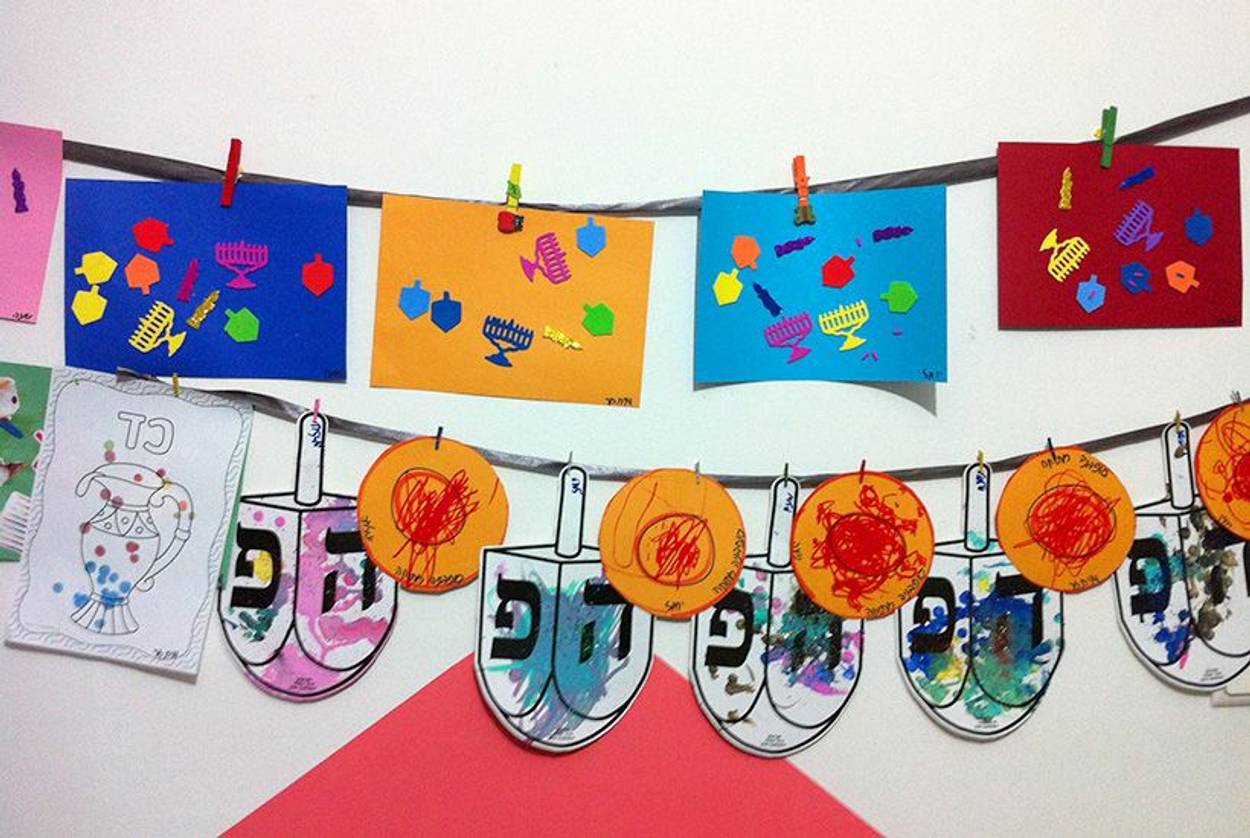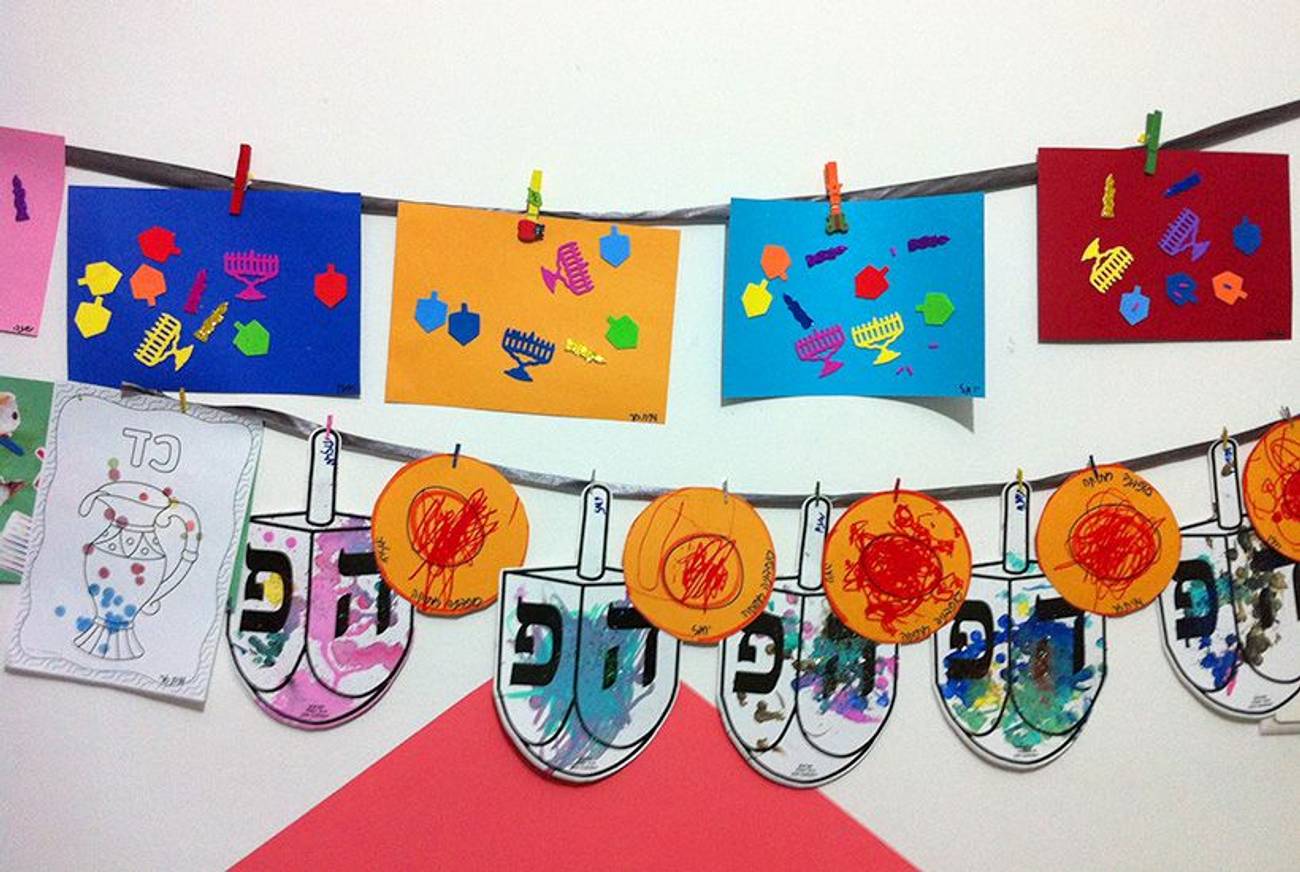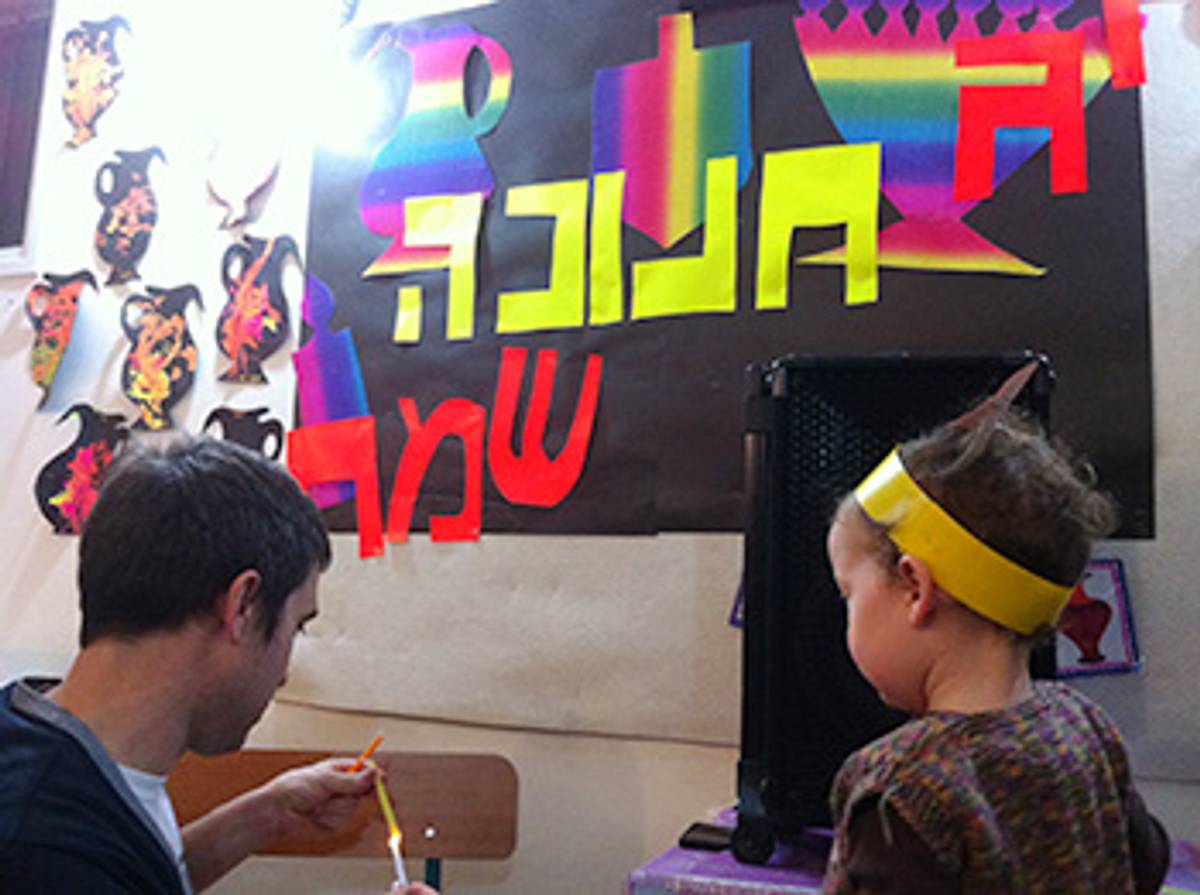Getting a New Perspective on Jewish Holidays—Through the Eyes of a Child
I didn’t know about the holidays until my son came home from preschool wearing a cardboard Hanukkah candle on his head




For secular Jews in Israel, Jewish holidays basically mean four things—none of them directly related to religion, tradition, or any of the specifics of any particular holiday:
Logistics. Is the pharmacy open on Chol HaMoed? When do the buses stop running on erev chag? Is there school on Tuesday?
Family—be it pleasant family reunions, mildly annoying events full of little nieces and nephews with runny noses running around and screaming their heads off, or atrocious tension-filled family dinners with all the muted drama of a Swedish art-house film.
Shopping—in particular stocking up on food before the shops close (see: Logistics) and buying a present for whoever is hosting this year’s atrocious tension-filled family dinner (see: Family).
Gift Cheques. These can be used in supermarkets and various big chain-stores and are the usual holiday bonus for salaried employees, which makes self-employed people resent the holidays even more than everybody else.
But even if this pretty much sums up the typical holiday experience for most secular Israelis, they still know something about the holidays. They might not observe the traditions, but they probably know what each holiday represents, why it started in the first place, and what biblical or historical story it relates to. This information is stored somewhere in the back of their minds, etched into their brains since they were little.
Not me. Since I didn’t grow up in Israel and never attended Hebrew school, I know next to nothing about the Jewish holidays. But now, that’s changing. At age 38, after 29 years living in Israel, I’m finally starting to learn about the Jewish holidays, and it’s all thanks to my son. He’s 2 and a half.
I grew up in Bonn—then the capital of West Germany—and never really experienced Jewish holidays as a child. I remember once attending a Passover Seder at a kibbutz we visited while on vacation in Israel (I didn’t understand the language but was highly impressed with the musical revue) and another large holiday dinner, with people I didn’t know and don’t remember, in which I accidently spilled juice all over the white faux-satin jacquard tablecloth. But these were isolated incidents.
Jewish holidays were never a big thing for my small, secular family. The minor ones were usually ignored altogether, while the High Holidays were mentioned and observed, but rather amateurishly. Passover dinner was never more than a regular family meal with matzo-ball soup, made out of an instant matzo-ball mix my mom brought home from her annual trip to Tel Aviv, and to this day, each year she asks my dad and me what the items on the Seder plate are (she uses a regular plate) and how many there are supposed to be. Needless to say, we don’t know the answer either.
Growing up among Christians and having only Christian and Muslim friends (at elementary school in Bonn I hung out with the Turkish Gastarbeiter’s kids, since we shared a weekly free-period when all the other kids had religion class), I struggled with understandable Christmas-envy. To ease my pain, my parents would give me presents at the same time my German friends got theirs. The gifts my friends got had nothing on the awesome medieval Lego castle I requested and ultimately got when I was 6 (I just had to convince my parents it wasn’t for boys). The only difference was that at my house it was called a Hanukkah present, not that I cared to share this information with my friends. This being Germany in the early ‘80s and not Orange County in the age of Seth Cohen, there was nothing in the way of Chrismukkah.
But presents were not enough. Since the modern Christmas tree originated in western Germany, I desperately coveted a Tannenbaum. After some resistance my parents finally agreed to get me a really small one, figuring that a big decorated tree would anger God, but a little spruce-branch would probably be all right.
My parents, like many secular parents living in countries where they are the religious minority, believed that all holidays are basically the same, the point ultimately being togetherness, a nice family dinner, and presents for the kids. If you’re not religious, there really isn’t a fundamental difference between gingerbread and sufganiyot, and if you ignore the part about dyeing hard-boiled eggs red to symbolize the blood of Christ, Easter is basically Passover. The only difference between “our” holidays and “their” holidays is, well, that these belong to us, and those don’t. Growing up surrounded by a lot of “them” and very little of “us,” I did get a bit of both worlds, but I never got more than a half-assed version of either.
When I was 7, we left Germany and moved to Honolulu, where we settled into a nice neighborhood with lots of Jews (my parents didn’t deliberately choose a Jewish neighborhood, it was just a good neighborhood), and for the first time in my life I finally got with the program. I still didn’t really know too much about the holidays, but at least my friends celebrated the same ones that I was supposed to. Then, when I was 9 my family made aliyah—not for any religious reason but because my mother, who’d grown up in Israel, had long dreamed of going back. We settled into an upper-middle-class neighborhood in Tel Aviv. It took me a while to fit in and by the time I did, I had reached the age where I couldn’t care less about the holidays anyway. The only holiday that held any significance for me at that point was Yom Kippur. Since in Israel there are no cars on the roads on the eve of Yom Kippur, all the kids from my neighborhood—including the cool high-school kids—would meet up in the evening at the big bridge over the Yarkon River in what was considered the social event of the year.
It’s safe to say that the holidays had little to no place in my life for many years to come. As an adult, before becoming a mother, I never observed any holiday, beyond attending this or that holiday dinner at my boyfriend’s family’s home. But this changed the moment my son started preschool. Or more precisely, the first time I saw him dancing with a cardboard Hanukkah candle on his head.
At preschool in Israel, holidays are The Big Thing. Even at the most nonobservant nursery or kindergarten, they’re all the rage. They are a child’s first brush with passing trends: Today little shofars are in, only to be replaced tomorrow by glow-in-the-dark dreidels. And holiday songs are a toddler’s equivalent of the Billboard Hot 100: Today we’re singing Tu B’Shevat songs, tomorrow we’re doing Purim medleys.
In Israel, little children learn about the holidays for weeks running up to the actual date, finger-painting over menorah cut-outs or gluing little pictures of lulavs and etrogs on empty shoeboxes. All this preparation culminates in a preschool holiday party in which the kids munch on their potato latkes, pomegranate seeds, or honey-dipped apple slices and spill non-alcoholic wine all over their little white shirts, while their parents capture every moment on their smartphone cameras. And when they return to their nursery school, after a long holiday in which their parents struggle to answer emails and get some work done while entertaining their children at home, they go on to learn about the next holiday in line, with the same level of enthusiasm, loving it no less than the previous one.
This is the naive and unadulterated version of Judaism, when holidays are just a series of fun rituals and symbols, songs and yummy foods. My son hasn’t yet reached the age where he asks questions about the customs he is taught, and I haven’t yet been required to search Wikipedia for answers to questions I’m sure I don’t have the answers to. So far so good.

Having the time of his life in his new world, which is filled with special fun days, my son is falling in love with the Jewish holidays, and as long as I look at them through his eyes, so am I. For better or worse, this is part of his socialization process and (sometimes aggressive) indoctrination into Israeli society. I guess that being an ex-olah chadashah—a status you never fully shed, no matter how many years you’ve lived in Israel—it’s basically the same thing for me. The first time I saw my kid dancing with a cardboard Hanukkah candle on his head was one of those rare occasions where I felt that I belonged. Other parents might be stressed out about the impending fire-hazard or the empty sufganiyot calories, but I can’t wait for this year’s pre-kindergarten Hanukkah party.
Dana Kessler has written for Maariv, Haaretz, Yediot Aharonot, and other Israeli publications. She is based in Tel Aviv.